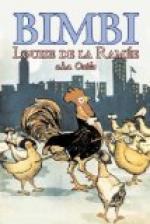The Stellwagen rolled on through the autumn mud, and that was one chance lost. He was sure that the first Findelkind had not felt ashamed when he had knocked at the first castle gates.
By and by, when he could not see Martinswand by turning his head back ever so, he came to an inn that used to be a posthouse in the old days when men traveled only by road. A woman was feeding chickens in the bright clear red of the cold daybreak.
Findelkind timidly held out his hand. “For the poor!” he murmured, and doffed his cap.
The old woman looked at him sharply. “Oh, is it you, little Findelkind? Have you run off from school? Be off with you home! I have mouths enough to feed here.”
Findelkind went away, and began to learn that it is not easy to be a prophet or a hero in one’s own country.
He trotted a mile farther, and met nothing. At last he came to some cows by the wayside, and a man tending them.
“Would you give me something to help make a monastery?” he said timidly, and once more took off his cap. The man gave a great laugh. “A fine monk, you! And who wants more of these lazy drones? Not I.”
Findelkind never answered; he remembered the priest had said that the years he lived in were very hard ones, and men in them had no faith.
Ere long he came to a big walled house, with turrets and grated casements,—very big it looked to him,—like one of the first Findelkind’s own castles. His heart beat loud against his side, but he plucked up his courage, and knocked as loud as his heart was beating.
He knocked and knocked, but no answer came. The house was empty. But he did not know that; he thought it was that the people within were cruel, and he went sadly onward with the road winding before him, and on his right the beautiful impetuous gray river, and on his left the green Mittelgebirge and the mountains that rose behind it. By this time the day was up; the sun was glowing on the red of the cranberry shrubs and the blue of the bilberry-boughs; he was hungry and thirsty and tired. But he did not give in for that; he held on steadily; he knew that there was near, somewhere near, a great city that the people called Sprugg, and thither he had resolved to go. By noontide he had walked eight miles, and came to a green place where men were shooting at targets, the tall thick grass all around them; and a little way farther off was a train of people chanting and bearing crosses and dressed in long flowing robes.
The place was the Hottinger Au, and the day was Saturday, and the village was making ready to perform a miracle play on the morrow.
Findelkind ran to the robed singing-folk, quite sure that he saw the people of God. “Oh, take me, take me!” he cried to them; “do take me with you to do heaven’s work.”
But they pushed him aside for a crazy little boy that spoiled their rehearsing.
“It is only for Hotting folk,” said a lad older than himself. “Get out of the way with you, Liebchen.” And the man who earned the cross knocked him with force on the head, by mere accident; but Findelkind thought he had meant it.




